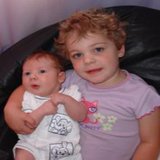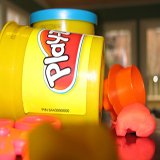Baby Language Development
If you grasp in amazement at the baby language development during the first year, then you will be stunned by the language explosion that occurs when they reach the toddler phase!
Your baby changed from a baby who could only cry into someone who could say his first clear word - all due to extensive infant language development.
In the second and third years, baby language development takes a tremendous surge forward, enabling them to take part in conversations, to relate their experiences and to voice their feelings.
Baby language development goes through various language development stages during this phase.
Baby Language Development
The Progress of Baby Language Development
When we look at baby language development, there are some main changes to look for in child speech development:
- vocabulary - At the age of 15 months, he can probably use about six clear words, most of which are names of people in the family or familiar objects.
Estimates vary but it is safe to assume that by the time he is 3 years old, he can use more than a thousand words, and of course he understands a lot more.
His vocabulary is very varied by this stage, and he is able to use words in an appropriate context in order to communicate effectively.
- structure - His ability to combine words together to form phrases and short sentences develops.
Initially, he could say only one word at a time, each word representing a complete thought.
Around the age of 18 months, he starts to combine two words together to form a meaningful phase, such as 'me teddy', meaning 'I want my teddy'
By the age of 3 he talks in short structured sentences, with at least three of four words in them.
- grammar - The typical 3 year old uses different types of words, not just nouns as he did when he first began to speak, but also adjectives, verbs and pronouns.
For instance, he might say 'I want my teddy', clearly indicating his wishes in a grammatically correct sentence.
He starts using words such as 'in' and 'on', and he is able to add 's' on to a word sometimes to make it plural. (In some cases he may dot this incorrectly, for example, saying 'mouses' instead of 'mice').
However, it is not until much later that he focus on how to learn language i.e. to use present, past and future tenses.
- pronunciation - Your toddler uses most consonants and vowels, although at times he becomes confused.
Word beginnings in particular often get mixed ('lellow' instead of 'yellow'). You may be tempted to laugh when he makes these normal mistakes but do your best not to.
In any case, his speech is clear enough for most children and adults to understand.
Listening Skills
Your child becomes a better listener during his second and third years, which aids baby language development, because it is through listening that he hears language spoken, and this enables him to interpret instructions and take part in conversations.
Remember, however, that he remains egocentric - he still expects the world to revolve around him and therefore he will often not feel any need to listen to you when you talk to him.
When you find that your 3 year old continues to watch television after you have asked him to come to the dining table for his evening meal, the changes are that he heard you but deliberately chose to ignore your message.
At this age, he's good at exercising 'selective attention'! On the other hand, a child who consistently fails to respond to comments directed at him may have a hearing problem.
If you're not sure whether your child ignores you by choice or because he simply doesn't hear properly, look for other possible indications of hearing impairment.
He might study your face ad mouth closely when you speak, he might ask you to repeat questions over and over, or he might mix up certain sounds in his speech (such as 't' and 'k').
None of these finding definitely signify a hearing loss, but if you are at all concerned, have his hearing checked by your family doctor.
Why speak?
Your child's ability to talk not only enables him to express himself easily and accurately, but also allows him to gather information - it's a great means of satisfying his endless curiosity. That's why your 2 or 3 year old starts to ask questions, and once he starts, he doesn't stop!
Prepare yourself for an onslaught of 'why', 'who', 'how', and 'what' questions. He doesn't ask these questions in order to confront you or to challenge your views; he has a genuine interest in the replies.
You'll discover that he has an amazing ability to ask about things that leave you at a loss for any easy answer. For instance, 'Why is the car that color?' or 'Why do you have hair?'
He is also likely to repeat questions, even though you thought you had answered them already. The fact is that your child may not have understood your initial explanation and so he wants you to tell him again.
This can be exceedingly frustrating for you, but his question stems from a genuine desire to use his improved language skills to enhance his understanding of the world around him.
He may use endless questions as a way of gaining and keeping you attention, which he loves. He'll have already learned that when you are talking to him, no matter what the subject matter, you are focused on him - and he wants to keep it that way.
Expert Advice
Looking for more questions and answers about language development in children?
Be sure to browse through all the baby language development pages that is broken down in different age groups.
Read more about the different language development stages.
Find It!
Can't remember where you read something specific? Just type in your search term in the box below and your specific topic will be returned to you instantly.









